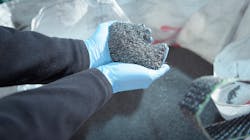Eaton’s Vehicle Group certifies 88% of its global facilities as zero-waste-to-landfill
Power management company Eaton announced its Vehicle Group has certified 88% of its global facilities as “zero-waste-to-landfill” (ZWTL), having cut the amount of waste going into landfills by 55% since 2019. Eaton defines ZWTL as consistently achieving a landfill waste diversion rate of 98% through reuse, composting, recycling, or incineration, but only if the heat generated by incineration was collected and used to create more energy than what was used in the incineration process.
“We are extremely proud of how we’ve come together to upgrade our manufacturing facilities, leveraging technology to improve energy efficiency, minimize environmental impact, and bring us closer to a carbon-free future,” said Sunil Bhandari, vice president, Global Operations, Eaton’s Vehicle Group. “Our commitment to sustainability is part of our core mission to improve the quality of life and the environment for those who count on us today and in the decades to come.”
To reduce waste, the Vehicle Group is focused on four primary areas: reuse, recycle, waste to energy, and waste to landfill.
Separating swarf from water and recycling keeps it from landfill
One of the key projects in these efforts is the Vehicle Group’s swarf grinding project, which is in the process of being implemented at all its global sites that perform grinding operations.
Swarf is a byproduct generated during metal-cutting processes when fluids such as oils, coolants, and water are mixed with fine particles of metal and filtration media. Swarf is one of the most difficult waste streams to recycle, but the Vehicle Group has made great strides in diverting swarf waste from landfills.
Through vendor partnerships, the Vehicle Group deploys a mobile centrifuge process that separates the materials. The fluid then is reused in manufacturing processes, and the metal particles are recycled, resulting in cost savings. A swarf recycling trial in 2019 diverted 500 tons from the landfill, and work is ongoing to expand this solution to expedite ZWTL progress.
The Vehicle Group is finding reuse opportunities to eliminate sludge created during the plating process by recycling the metal content, which eliminates the need for disposal into a landfill. It is also working to develop a more efficient filtering process to remove sludge and reuse the water for further plating.
Additionally, significant progress is being made in the segregation of general trash. Trash is typically created from a lack of knowledge of recycling opportunities and the use of unrecyclable materials. In an effort to prevent paper, metal, and recyclable plastics from going into the trash, the Vehicle Group is working to improve education around recycling opportunities and procedures. Along these same lines, the Vehicle Group is ensuring all packaging it uses is recyclable and is encouraging its suppliers to do the same.
“For these efforts to realize their full potential, we are educating our teams on correct recycling methods, and we are asking for input on how to identify issues and new areas of opportunity,” Bhandari said.
Water conservation efforts making a significant impact at global sites
Implementing several innovative initiatives, the Vehicle Group has lowered water consumption at its global sites by 14% since 2019, putting it well on its way to achieving its 2030 zero water discharge target.
To reduce water consumption and mitigate pollutants, the Vehicle Group is installing wastewater systems featuring ultrafiltration and reverse osmosis technologies at several of its facilities. The systems treat and reuse water for industrial purposes. Some facilities are also managing stormwater by increasing the permeability of their property, decreasing runoff rates to reduce erosion, and planting native florae that don’t require watering. Additionally, automatic flow-sensor faucets are being installed at Vehicle Group global facilities to enable the reuse of chiller water used during daily operations.
Read more about Eaton’s commitment to sustainability in its latest Sustainability Report.
